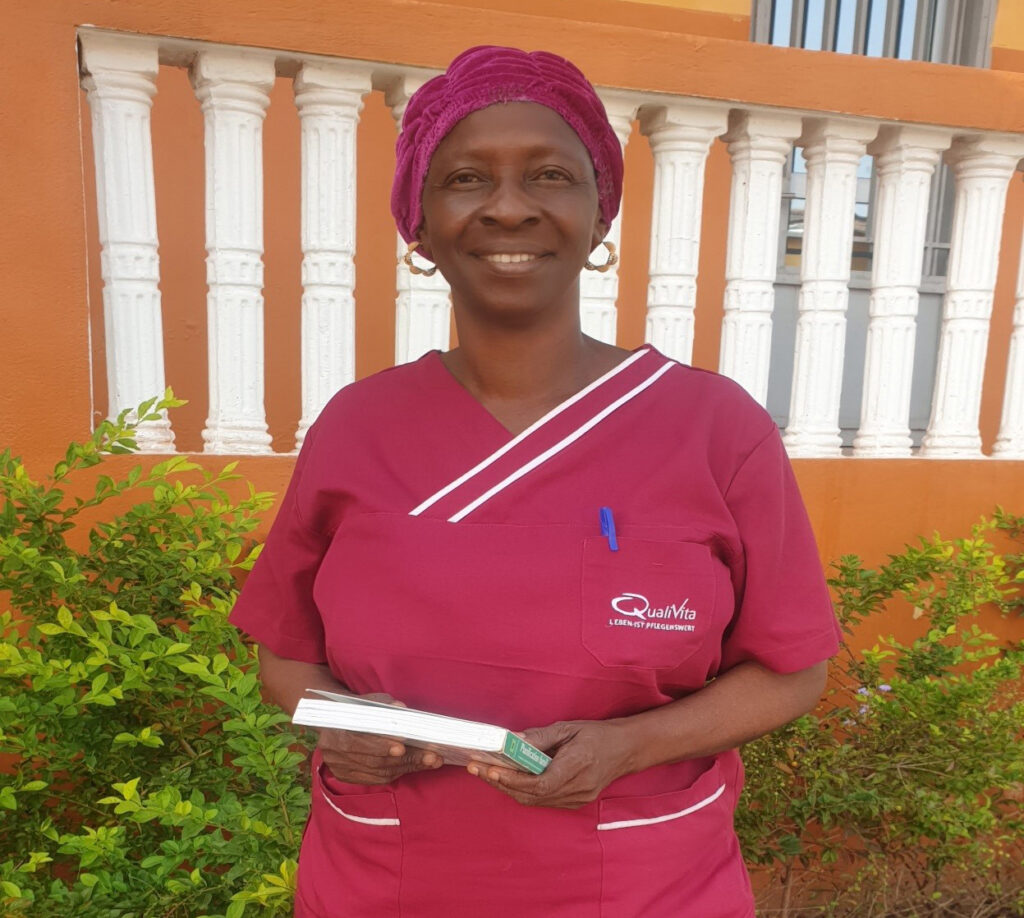The frantic call from a nurse at the Koukoudé health post came in at 8 p.m. A woman in labor with twins had given birth to the first baby, but now, hours later, the second baby had not yet arrived.
Immediately, Kalaya Kourouma, a midwife at the Boffa District Hospital in Guinea, alerted a district coordinator who dispatched an ambulance that would take Kalaya to the laboring mother’s bedside. Before setting out, Kalaya assembled an emergency kit, which included a delivery kit, oxytocin to prevent postpartum hemorrhage, a pair of gloves, a blood pressure monitor, a mask and oxygen.

By the time the ambulance delivered the midwife to Koukoudé village at 9:00 p.m., the family at the scene was panicking. Kalaya’s examination revealed that the woman’s blood pressure was low—and that the unborn twin was in a breech presentation.
Through the Health Service Delivery (HSD) project, initiated in 2016 in partnership with the Ministry of Health in Guinea and funded by the U.S. Agency for International Development, Jhpiego helped create mobile clinics as a way to serve hard-to-reach communities and develop trust in the health care system. It’s part of an ongoing effort to address underutilization of health care services and facilities by communities that have lost trust in them, whether because of the Ebola epidemic or due to poor quality and availability of care—all of which exacerbate people’s wariness.
Boffa District Hospital, where midwife Kayala works, has received HSD project support for various interventions related to maternal health: training in basic and comprehensive emergency obstetric and newborn care, provision of equipment and materials, regular supervision, and establishment of a continuous quality improvement process for the workplace.
The HSD project received supplemental funding in 2019 specifically for outreach activities. To this end, the project created mobile clinics as a way to provide health services to women in hard-to-reach communities using ambulances purchased by the project during weekly open-air markets in different villages. However, the COVID-19 pandemic and resulting restrictions interrupted full implementation. The project changed its strategy and designated these ambulances as mobile clinics to meet the obstetrical referral needs of district maternity hospitals.
It was one of those ambulances that midwife Kalaya commandeered to transport herself and the mother, along with newborn twin No. 1, to the district hospital.
Just a few miles into the journey, the mother’s contractions started again. The midwife called for the ambulance to stop. Then and there, in the vehicle, she capably and safely performed a breech delivery, following the national protocol. A healthy baby boy was born at 9:30 p.m. Kalaya conducted an initial newborn assessment and provided appropriate care.
The driver took to the road again, driving cautiously and finally arriving at 11:00 p.m. at the district hospital, where a care team of midwives, nurses and doctors awaited the woman and her two babies. After three days of observation, they returned to their village. The woman’s mother-in-law and husband repeatedly blessed and thanked the staff, especially the quick-acting Kalaya who had come to their rescue.
The mother received family planning counseling at the hospital and chose an implant, which was inserted before discharge. The midwife followed up with the health post and confirmed that the mother had returned for postnatal care and was doing well.
Through the HSD project, Kalaya, a widow and mother of five, said she and her department colleagues have been made to feel like “queens.” “I feel proud of the job I’m doing! What made this experience even more special for me was the communication with the hospital team to prepare everything before our arrival, including the laboratory and the operating room,” she said.
The availability of the ambulance has put us at ease, because it reduces referral delays. We can call the district coordinator of the project directly at any time and off we go, right away!
Kalaya
The mother of twins is just one of about 50 women from remote areas transported by the project ambulance to the hospital over six months (October 2020 through March 2021). All presented with complications, including hemorrhaging during the first or last trimester, prolonged labor, eclampsia, abnormal presentation of the baby and postpartum anemia.
Working in the Boffa district since the start of HSD, the project has achieved encouraging results there despite the challenges of the pandemic. The district has seen a 28% increase in assisted deliveries, with use of the partograph to monitor labor increasing from 18% to 77%, and active management of the third stage of labor increasing from 60% to 99%, and a decrease in the incidence of postpartum hemorrhage from 0.9% to 0.6%. Of special note, the hospital was awarded its first star by the Ministry of Health through the HSD project for improving the quality of services through performance standards in emergency obstetric and newborn care, family planning and infection prevention and control.
Jacqueline Aribot, Director of Monitoring and Evaluation, and Mohamed Nioké V, District Project Coordinator, are with Jhpiego’s Guinea Office.



